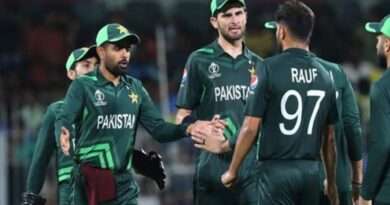India’s Refusal to Tour Pakistan Puts the Champions Trophy at Risk
|
Getting your Trinity Audio player ready...
|
India’s decision to refuse touring Pakistan for the upcoming ICC Champions Trophy has placed the tournament’s future in doubt. The move has sparked discussions and concerns about the stability of international cricket events. Both the Board of Control for Cricket in India (BCCI) and the International Cricket Council (ICC) are advocating for a hybrid model to host the event, allowing India and Pakistan to play in different venues. However, the Pakistan Cricket Board (PCB) is resisting this suggestion, complicating the situation further.
In this article, we explore the implications of India’s refusal, the stance of the PCB, and the potential outcomes if this impasse continues.
India’s Stance and PCB’s Reaction
Government Refusal Sparks Controversy
On Friday night, the PCB received an email from the ICC, citing an official letter from the Indian government that declined permission for the Indian cricket team to travel to Pakistan for the Champions Trophy. In response, the PCB promptly informed the Pakistani government, which expressed disappointment and concern. According to government officials, the refusal challenges national pride and creates an uneven playing field.
The Pakistani government’s position is clear: if other countries are willing to visit Pakistan, India should not be exempt without a valid justification. Pakistan has made significant efforts in recent years to host international teams, demonstrating its capability to ensure player safety and deliver successful events.
PCB’s Planned Response to ICC
Within the next 24 to 48 hours, the PCB is expected to send a formal letter to the ICC outlining Pakistan’s stance. This letter is likely to address the following:
- Pakistan’s Commitment: The PCB may emphasize that Pakistan has shown flexibility in the past, participating in ICC events in India and accommodating other requirements to support international cricket.
- Boycott Warning: Pakistan may hint at withdrawing from future ICC events involving India if the current situation remains unresolved.
- Request for Explanation: The PCB is expected to request an official explanation from the BCCI and may consider legal options if India continues to avoid Pakistan-hosted events.
The Impact of India’s Absence on the Champions Trophy
Financial and Viewership Concerns
The potential absence of India from the Champions Trophy raises significant concerns for the ICC and its commercial partners. India-Pakistan matches are among the most-watched events in global sports, generating immense viewership and sponsorship revenue. For instance, their 2023 World Cup match drew 173 million viewers on Indian television alone, while the 2021 T20 World Cup match engaged over 15.9 billion minutes in India. These numbers highlight the economic impact of these high-stakes games.
Without India’s participation, the Champions Trophy could face:
- Reduced Viewership: An India-Pakistan match attracts global audiences, making it a key revenue driver. Without India, the viewership would likely decline, affecting the tournament’s overall appeal.
- Financial Losses: The ICC secured $3.2 billion in broadcast rights for the 2024-2027 cycle, and India-Pakistan matches are a major part of this valuation. Sponsors and broadcasters expect both teams to participate, and India’s absence could lead to renegotiations or potential financial losses.
- Potential Legal Disputes: The ICC may face legal challenges from commercial partners who anticipated India-Pakistan matches. Without these matches, sponsors might consider contractual disputes, potentially affecting ICC’s financial stability.
Impact on ICC’s Financial Distribution
The ICC’s financial model relies on revenue generated from marquee events, which is then distributed among member nations to support cricket development worldwide. If the Champions Trophy suffers financial setbacks due to India’s refusal, smaller cricketing nations could experience reduced funding, impacting their growth and competitive capabilities.
While the BCCI might be less affected, as it generates significant revenue domestically, other cricket boards depend heavily on ICC distributions. Reduced funding could strain their programs and disrupt the balance of global cricket.
Pakistan’s Stand on India’s Refusal
Pakistan’s Potential Boycott of Future Tournaments
The PCB is reportedly considering boycotting tournaments featuring India if this standoff continues. Such a stance would be unprecedented in modern cricket but reflects Pakistan’s frustration with India’s recent decisions. In 2023, India opted for a hybrid model for the Asia Cup, resulting in Pakistan hosting only a portion of the matches. This compromise did not sit well with the PCB, and Pakistan’s government has since been contemplating a policy of restricting its teams from competing against India unless political and sports-related issues are separated.
Pakistan’s Self-Sufficiency in Cricket
Unlike other cricket boards, Pakistan has managed to sustain its cricket program without bilateral series against India and without access to the lucrative Indian Premier League (IPL) since 2009. Despite these limitations, Pakistan has claimed major international titles, including the 2009 T20 World Cup and the 2017 Champions Trophy. This resilience reflects Pakistan’s capacity to maintain its competitiveness without depending on India. However, the loss of an India-Pakistan fixture in the Champions Trophy could hurt global cricket more than it affects Pakistan directly.
Possible Resolutions to the Conflict
The Hybrid Model Solution
To salvage the Champions Trophy, the ICC and BCCI have proposed a hybrid model, where India’s matches would be held in a neutral venue, such as the United Arab Emirates (UAE). However, the PCB has resisted this model, arguing that it undermines Pakistan’s status as a capable host. Furthermore, UAE authorities have not yet been contacted to discuss this arrangement, leaving the hybrid model in limbo.
Negotiations Between the ICC, BCCI, and PCB
The ICC may need to mediate discussions between the BCCI and PCB to reach a compromise that allows the Champions Trophy to proceed smoothly. This could involve addressing security concerns, revisiting venue options, or providing additional assurances to both boards. An agreement will be crucial to avoid future disruptions and ensure that the tournament maintains its competitive appeal.
FAQs
1. Why is India refusing to tour Pakistan for the Champions Trophy?
- India’s government has declined permission for the national team to travel to Pakistan, likely due to security and diplomatic concerns. The BCCI is exploring alternative solutions, such as a hybrid model.
2. What is the hybrid model proposed for the Champions Trophy?
- The hybrid model suggests holding India’s matches in a neutral venue, possibly the UAE, while the rest of the tournament occurs in Pakistan. This model aims to address India’s security concerns.
3. How does India’s absence affect the ICC Champions Trophy?
- India’s absence could reduce viewership, lower sponsorship revenue, and potentially lead to legal disputes with commercial partners. It would also weaken the tournament’s appeal as India-Pakistan matches are a major draw for fans worldwide.
4. Will Pakistan boycott future ICC events involving India?
- If India continues to avoid playing in Pakistan, the PCB might consider boycotting future tournaments that include India. This decision, however, would require further deliberation with government officials.
5. What could be the long-term impact on international cricket if this issue is unresolved?
- If unresolved, this issue could strain ICC’s finances, reduce funding for smaller cricketing nations, and create divisions within the cricket community. It may also set a precedent for future tournaments facing similar conflicts.
Conclusion
India’s refusal to tour Pakistan for the Champions Trophy has placed the tournament’s future on shaky ground. The ICC, BCCI, and PCB must find a middle ground to avoid jeopardizing a high-profile event and to ensure the continuity of international cricket. With financial stakes, fan expectations, and cricketing pride on the line, the outcome of these discussions will shape the landscape of cricket diplomacy in the years to come.




